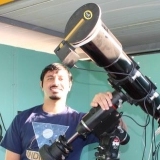INDI Library v2.0.7 is Released (01 Apr 2024)
Bi-monthly release with minor bug fixes and improvements
Initialization of Sesto Senso
- Rolf Meyerhoff
-

- Offline
- Junior Member
-

- Posts: 23
- Thank you received: 9
Replied by Rolf Meyerhoff on topic Initialization of Sesto Senso
After a fresh boot without INDI the focuser behaves the same as we've seen it here in the thread: #GT10000! moves inward.
I've recalibrated the focuser again under Windows and reconnected it to the Raspi. When I sent a #GT10000! then the tube moved outward as it should.
Now I started INDI and the focuser moves inward again. Not just in INDI but also in the terminal.
It seems like INDI is doing something that the firmware of the Sesto Senso doesn't like at all.
Please Log in or Create an account to join the conversation.
- Rishi Garrod
-

- Offline
- Elite Member
-

- Posts: 245
- Thank you received: 56
Replied by Rishi Garrod on topic Initialization of Sesto Senso
The only command Indi sends out (except for requests for status) is '#SM;0096746!'
The response is `SM;96746! which seems good.
Maybe the Sesto firmware has an issue with the Set Max command?
When the Sesto software calibrates it uses the #SM! command to set to the current position so it does not use the #SM;XXXXXXX! command.
Maybe it doesn't like he leading zero's or the whole command.
Now I need to setup a build environment to see if changing/removing the command makes any difference.
Please Log in or Create an account to join the conversation.
- Jasem Mutlaq
-

- Away
- Administrator
-

Replied by Jasem Mutlaq on topic Initialization of Sesto Senso
Please Log in or Create an account to join the conversation.
- Rishi Garrod
-

- Offline
- Elite Member
-

- Posts: 245
- Thank you received: 56
Replied by Rishi Garrod on topic Initialization of Sesto Senso
Now to start the process of elimination.
Please Log in or Create an account to join the conversation.
- Rishi Garrod
-

- Offline
- Elite Member
-

- Posts: 245
- Thank you received: 56
Replied by Rishi Garrod on topic Initialization of Sesto Senso
I copied the shared library to /usr/bin on the Stellarmate but now it does not recognise it when I try and start up Ekos.
I guess this is not the correct procedure. What is the minimum I need to do in order to make changes and test?
Please Log in or Create an account to join the conversation.
- Jasem Mutlaq
-

- Away
- Administrator
-

Replied by Jasem Mutlaq on topic Initialization of Sesto Senso
Why don't you build on StellarMate? just use the same procedures.
Please Log in or Create an account to join the conversation.
- Rishi Garrod
-

- Offline
- Elite Member
-

- Posts: 245
- Thank you received: 56
Replied by Rishi Garrod on topic Initialization of Sesto Senso
Please Log in or Create an account to join the conversation.
- Rishi Garrod
-

- Offline
- Elite Member
-

- Posts: 245
- Thank you received: 56
Replied by Rishi Garrod on topic Initialization of Sesto Senso
I first removed the leading padding with nulls (%07d replaced with %d) from the SM commands but that did not help
The Sesto app sends the focuser to a position and then uses the #SM! command, maybe thats their workaround.
I will now do some more extensive testing and if this works see if I can come up with a work around OR we simply accept that the initialisation is done from the Sesto app. I must say I am leaning towards letting the Sesto app do the initialisation . The less the Indi driver has to do the more stable and future proof it is.
@Jasem, if you can send a mail to PrimaLucelabs then I can ask them if there are any known issues (they will only talk to me if you say its OK) with these commands.
Please Log in or Create an account to join the conversation.
- Rolf Meyerhoff
-

- Offline
- Junior Member
-

- Posts: 23
- Thank you received: 9
Replied by Rolf Meyerhoff on topic Initialization of Sesto Senso
Please Log in or Create an account to join the conversation.
- Rishi Garrod
-

- Offline
- Elite Member
-

- Posts: 245
- Thank you received: 56
Replied by Rishi Garrod on topic Initialization of Sesto Senso
I am pretty convinced now that its the SM and Sm commands that mess things up. As soon as I stop sending these commands the focuser works perfectly.
My suggestion is to remove the ability to set the max position but still display it. That way we have the feedback to know its still OK but we can no longer set the max position. If you want to alter the max position use the Sesto app.
OR
We could add a button to set the current position as the max as this does not seem to cause any issues.
Please Log in or Create an account to join the conversation.
- Nils Harnischmacher
-

- Offline
- Junior Member
-

- Posts: 35
- Thank you received: 1
Replied by Nils Harnischmacher on topic Initialization of Sesto Senso
Thank you for all that awesome work!
Please Log in or Create an account to join the conversation.
- Rishi Garrod
-

- Offline
- Elite Member
-

- Posts: 245
- Thank you received: 56
Replied by Rishi Garrod on topic Initialization of Sesto Senso
Does anyone else have a Sesto Senso on the StellarMate/RPi or Ubuntu?
If so I would like to send you the library so we can confirm that this does solve the problem.
Please Log in or Create an account to join the conversation.
